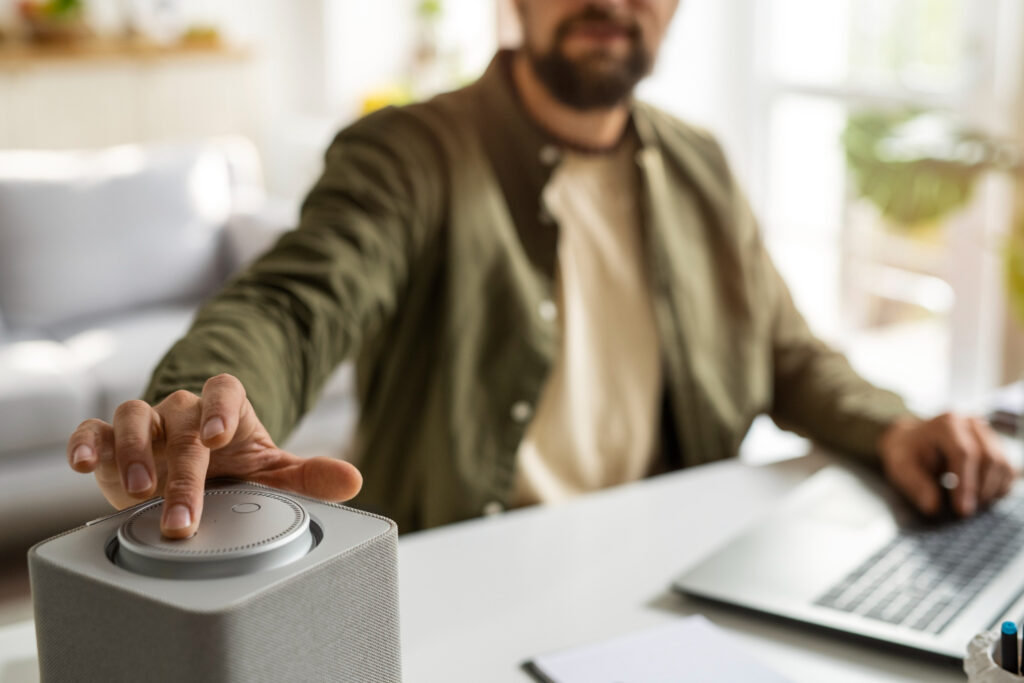You’ve finally found the perfect quiet spot to relax – maybe it’s your bedroom at 2 AM, or that peaceful corner of the library you’ve been eyeing. You settle in, ready to enjoy the blissful silence, and then… ring ring ring. That familiar sound in your ears seems to get louder, more insistent, almost mocking your attempt at finding peace.
Here’s where things get interesting (and a little weird). Most of us associate quiet spaces with relaxation and peace of mind. But for people dealing with ear ringing, these same spaces can become unexpectedly challenging. It’s not that silence is inherently bad – it’s more like your brain and ears have developed this complicated relationship with the absence of sound.
Think about it this way: during your busy day, you’re surrounded by a constant symphony of environmental sounds. The hum of air conditioning, distant traffic, people chatting, your computer fan whirring – all these sounds create what researchers call a “masking effect.” Your brain gets busy processing all this external input, and that internal ringing kind of fades into the background, like background music in a restaurant that you don’t really notice until it stops.
But when you step into a really quiet room, suddenly there’s nothing competing for your auditory attention. In a quiet room, this masking effect is diminished, making the tinnitus more apparent, and your brain’s sensitivity to internal signals can actually increase. It’s like turning off all the lights in a room and suddenly noticing that tiny LED on your electronics that you never saw before.
Your Brain’s Background Orchestra
Now, here’s something that might blow your mind: even in the quietest rooms, your body is never truly silent. The cochlea is active electrically in the absence of sound stimulation and the different array of sounds produced internally by the body (heart contractions, head and neck joint and muscle movement, blood flow etc.) are often masked by external sounds in the environment.
Your body is essentially running its own little orchestra 24/7 – your heart pumping, blood flowing, muscles moving, joints creaking slightly. Under normal circumstances, the sounds of daily life mask these internal bodily sounds. But remove that external audio blanket, and suddenly you might become aware of sounds you never noticed before.
For some people, this heightened awareness in quiet environments can make the whole tinnitus experience more noticeable and, frankly, more frustrating. It’s like your ears are saying, “Oh, you wanted quiet? Here, let me fill that silence for you!”
The Science Behind the Silence Struggle
Researchers have been fascinated by this phenomenon for decades. They concluded that tinnitus‐like activity is a natural phenomenon perceived by many in a quiet enough environment. This means that even people without chronic tinnitus might notice some ear sounds if they’re placed in an extremely quiet environment – it’s just that most of us rarely encounter such complete silence in our daily lives.
What makes this particularly interesting is how our brains adapt to different sound environments. When external noise is minimal, the brain’s sensitivity to internal signals, such as those associated with tinnitus, can increase. The lack of competing stimuli may make the tinnitus seem much more prominent than it actually is.
It’s similar to how your eyes adjust to darkness – they become more sensitive to detect even the smallest amounts of light. Your auditory system can work in a similar way, becoming more attuned to subtle sounds (including internal ones) when the external environment is very quiet.
Real People, Real Experiences
If you’ve ever wondered whether you’re the only one dealing with this strange silence-makes-it-worse phenomenon, you’re definitely not alone. People suffering from tinnitus will find that the condition worsens in quiet environments. The ringing or buzzing in their ears becomes even louder when there are no other sounds to distract them from it.
Many people find that their most challenging times are often the quietest ones – trying to fall asleep at night, early morning hours, or during meditation attempts. Tinnitus maskers are commonly used by tinnitus sufferers when trying to sleep or relax, as it is within these quiet environments that the tinnitus is at its most noticeable.
One interesting observation from people who live with this daily is how stress and fatigue can amplify the effect. When he is stressed or sleep deprived, the tinnitus gets worse, for example. Relaxation helps. So do weekends. This suggests that our mental state and stress levels play a significant role in how we perceive and respond to both silence and internal ear sounds.
Creating Your Sound-Friendly Environment
So, what’s a person to do? The goal isn’t to avoid quiet spaces entirely (that would be pretty impractical), but rather to understand how to create environments that work better for you.
Many people discover that introducing gentle, consistent background sounds can make a huge difference. This doesn’t mean you need to crank up music or live in a noisy environment – quite the opposite. For better sleep at night, playing soft music or using ambient sound machines can help mask the sounds of tinnitus. Additionally, utilizing an air conditioner to keep the room cool can aid in sleep quality. The consistent noise level it provides helps minimize the disturbance.
The key is finding sounds that provide gentle masking without being distracting or stimulating. Think white noise machines, soft nature sounds, gentle fans, or even the subtle hum of an air purifier. These sounds create what audiologists call “sound enrichement” – they give your auditory system something to process without overwhelming it.
The Art of Sound Layering
Here’s where you can get creative with your environment. Instead of thinking about eliminating all sound, consider curating it. Some people find success with:
Consistent, Low-Level Sounds: A small fan, air purifier, or white noise machine can provide steady background audio that doesn’t draw attention to itself but fills that acoustic void.
Natural Ambient Sounds: Gentle rain sounds, soft ocean waves, or forest sounds can create a peaceful backdrop that feels relaxing rather than intrusive.
Functional Sounds: The hum of a refrigerator, air conditioning, or even a fish tank filter can provide the kind of consistent, ignorable sound that helps mask internal ear sounds.
Soft Music or Audio: Some people find that very quiet instrumental music, nature documentaries, or even audiobooks at low volume can help redirect their auditory focus.
The trick is finding sounds that feel natural and comfortable to you – ones that blend into the background rather than demanding your attention.
Timing and Personal Patterns
One fascinating aspect of this whole silence-tinnitus relationship is how individual it can be. Some people notice their ear sounds are more prominent in the morning quiet, others find evening silence more challenging. Some discover that certain types of quiet environments (like libraries) feel different from others (like their bedroom at night).
Pay attention to your own patterns. Do you notice the sounds more during certain times of day? In specific locations? When you’re feeling stressed or tired? Understanding your personal relationship with quiet environments can help you make small adjustments that have a big impact on your comfort level.
Beyond Just Masking
While sound masking can be incredibly helpful, it’s worth noting that this isn’t necessarily about hiding from the problem forever. Sound masking can cover the sound of tinnitus, while more advanced therapies may provide more robust relief. Many people find that understanding and working with their acoustic environment is just one piece of a larger puzzle that includes stress management, sleep hygiene, and overall lifestyle factors.
Lifestyle changes such as avoiding irritants (including loud noises, caffeine, and nicotine), managing stress, reducing alcohol intake, and using a fan or soft music to help mask the noise can all play a role in how you experience both silence and tinnitus.
The Social Side of Sound
One thing that often gets overlooked is how this affects social situations. Many people become self-conscious about their need for background sound, worried that others will find it strange or annoying. The truth is, most people find gentle background sounds quite pleasant – there’s a reason coffee shops, restaurants, and spas use ambient sound design.
Don’t be afraid to advocate for your acoustic needs in shared spaces. Most people are happy to have a small fan running or some soft music playing, especially if you explain that it helps you feel more comfortable and relaxed.
Embracing Your Sound Preferences
Rather than seeing your sensitivity to quiet environments as a limitation, try reframing it as developing a sophisticated understanding of your acoustic preferences. You’re becoming more aware of how sound environments affect your well-being – and that’s actually pretty valuable knowledge.
Many people discover that once they start paying attention to their sound environment, they become better at creating spaces that feel genuinely comfortable and peaceful. You might find yourself becoming the person others come to for advice about creating relaxing atmospheres!
The Bottom Line
So, can too much silence make tinnitus worse? The short answer is: for many people, yes, it can make it more noticeable and bothersome. But this doesn’t mean you’re doomed to avoid quiet spaces forever. It means you get to become an expert in creating the kind of acoustic environment that works best for you.
Remember, this is about comfort and quality of life, not about fighting against your ears or trying to force them to behave differently. Work with your auditory system rather than against it. Embrace the fact that you might prefer a gentle hum of background sound – there’s nothing wrong with that, and you’re certainly not alone in finding that a little bit of sound makes silence much more enjoyable.
The goal isn’t perfect silence anyway – it’s peaceful comfort. And sometimes, achieving that peace means adding just a touch of gentle sound to fill the acoustic space in a way that feels natural and relaxing.
Your ears, your rules. Create the sound environment that helps you feel your best, and don’t worry about what anyone else thinks about your preferences. After all, we all have our own ways of finding comfort and peace – yours just happens to include a little bit of thoughtful sound curation.

Disclaimer: Thanks for reading — from all of us at First News US. This article is for informational and lifestyle purposes only and is not intended as medical advice, diagnosis, or treatment recommendations. The information provided should not be used as a substitute for professional medical consultation, diagnosis, or treatment. Always seek the advice of qualified healthcare providers with any questions you may have regarding tinnitus, hearing concerns, or any other medical condition. Never disregard professional medical advice or delay in seeking it because of something you have read in this article. If you think you may have a medical emergency, call your doctor or emergency services immediately.
Sources: Information in this article is based on research from peer-reviewed medical literature, hearing health organizations, and lifestyle health resources, including content from the American Tinnitus Association, Mayo Clinic, Johns Hopkins Medicine, and various audiology research publications. Individual experiences may vary, and this content reflects general lifestyle information rather than personalized recommendations.



